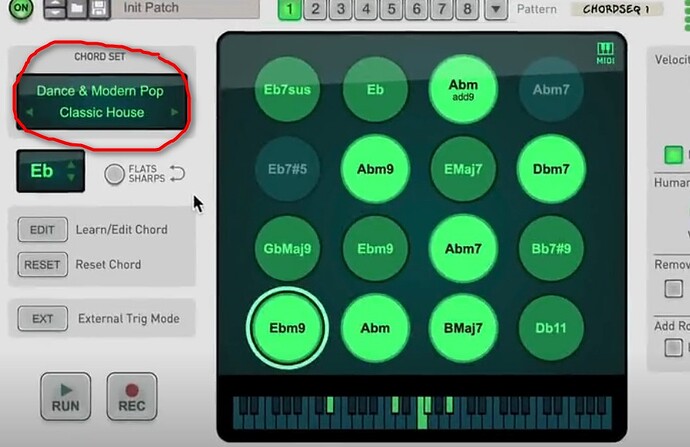I just posted this video on Youtube to explain it
Scaler in combination with Opus Orchestrator
How to make a perfect DIVISI
Scaler Opus - YouTube
Thanks for the very good video. This already clarifies a lot of things.
The Reason player is cool. Fits with the 16 pad controller layout. You can get the bass notes out on the back (as CV) and route those to another device or synth.
It only suggests within the 16 existing chords, unlike Scaler that suggests based on theory (I guess, or some Algo).
That little sequencer is nice for testing out ideas. But there is no per chord performance like Scaler, however you can add any of the other players to generate more ideas.
If you run the sequencer you can change the chordset to any of eight sets (16 chords each), and you can play in your own chords to the pads or edit the existing.
The patch saving is straight forward, unlike Scaler that isn’t as easy. But Scaler is better at opening a new chordset and grab a single chord to whatever you are building up in your set.
It doesn’t have the scale analysis part like Scaler.
If is a bit pricey for what it does, I think Scaler offers more on a whole, but they do offer slightly different things.
I own Reason 12 and am no fan of subscriptions either.
The most notable moment in that video for me was this interesting chord transition at 1:04
Got me interested how to add musical drama moment ![]()
I watched the video in question again, but this time something hit me. Take the examples he gave at 6:47 (the IV I vi V progression) and 9:33 (Ostinato), fire up Scaler and ready to roll you have all the elements of each of these examples, which can then be quickly assembled. Add Omnisphere, Trillian,DUNE3, your favourite drum VST and BBC SO, and suddenly you have a corporate video in no time.
In essence repeating the point made by @Enkerli in the original post, Scaler, probably which would be much to @davide 's chagrin, is a perfect instant corporate propaganda creation tool …
Thanks for the reminder on Scaler’s support for Neo-Riemannian modulations.
For those who want to know a bit of the theory involved (or brush up on this understanding), this explanation might be useful:
Neo-Riemannian Triadic Progressions
Related to this specific thread, what Joshua does in this video reminds me more distinctly of film music than corporate videos:
Unsurprisingly, this comes out as one of the first results in my DuckDuckGo search on Neo-Riemannian modulations:
Film Music and Neo-Riemannian Theory
(Of course, there’s a strong connection between film scores and music meant for corporate videos. I guess a core distinction is in how composers handle tensions and dissonance.)




